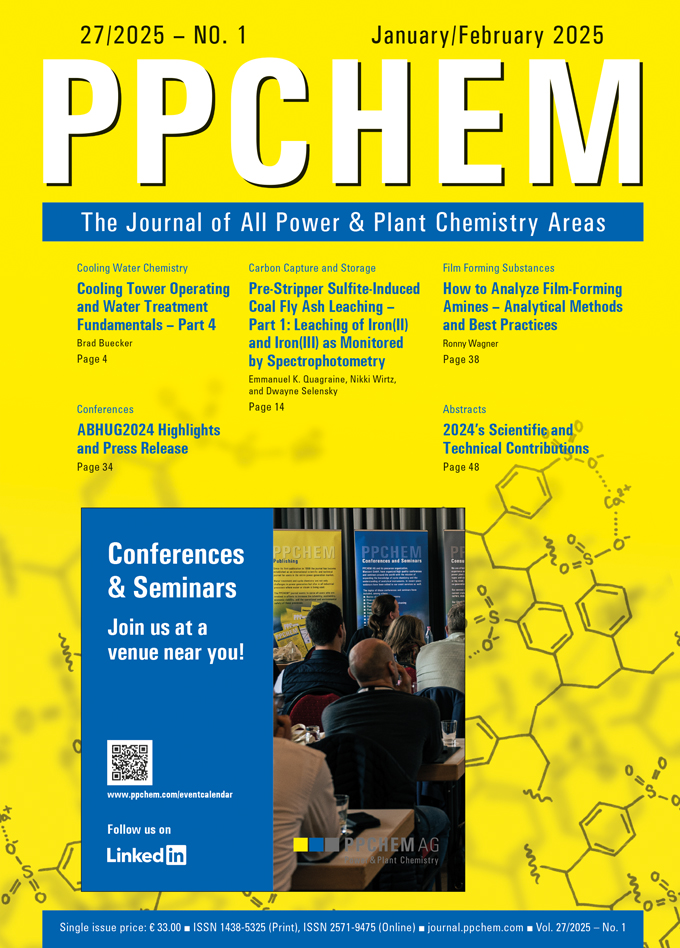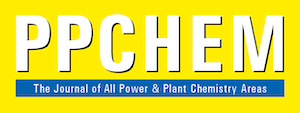Author: anderthalbAdmin
Issue 01 (2025)

For members only
ABSTRACTS
Cooling Tower Operating and Water Treatment Fundamentals – Part 4
Brad Buecker
Cooling towers and cooling water systems are an integral feature of many power plants and thousands of industrial facilities. The previous installments of this series focused on microbiological fouling and corrosion issues, as these mechanisms can cause severe problems. But by their very nature, cooling towers, in which water evaporation is the primary heat transfer method, cause an increase in concentration of both dissolved and suspended solids. Deposition and scaling can become quite problematic without careful chemistry control. This installment examines scale-forming mechanisms. In Part 5, we will examine modern corrosion/scale control chemistry. Some chemical inhibitors serve a dual function.
PPCHEM® 2025, 27(1), 4–8
For Members only
Pre-Stripper Sulfite-Induced Coal Fly Ash Leaching – Part 1: Leaching of Iron(II) and Iron(III) as Monitored by Spectrophotometry
Emmanuel K. Quagraine, Nikki Wirtz, and Dwayne Selensky
Iron (Fe) is known to catalyze oxidative degradation of amines in the post combustion CO2 capture (PCCC) process. However, sources of Fe for such degradations are poorly characterized. One aspect of the PCCC process which is poorly researched is the interaction of sulfur dioxide (SO2) gas in the flue gas (FG) with coal fly ash (CFA) and how this can affect amine degradation. Understanding that the SO2 would be dominantly present in the anionic pH speciated forms (bisulfite (HSO3–(aq)) and sulfite (SO32–(aq))) as a result of caustic scrubbing or amine-based desulfurization and that ammonia is commonly present either in original FG or as an amine degradation product, CFA leaching of Fe by ammonium sulfite ((NH4)2SO3) was experimentally examined under different pH (~ 4 to 10) and temperature (50 °C to 90 °C) conditions to simulate various pre-stripper sections within an amine solvent based SO2 and carbon dioxide (CO2) capturing process such as at the Boundary Dam Unit 3 carbon capture and storage (BD3 CCS) facility. The results suggest that SO2 and its pH-speciated aqueous forms can leach Fe, and thereby catalyze oxidative degradation of common amines used in capturing acidic contaminants from post-combustion FG. With the addition of (NH4)2SO3 (0.25 mol ⋅ L–1), the effect of SO32– on the leaching of iron(III) (Fe3+) and iron(II) (Fe2+) was apparent and distinctly different from the effect of pH per se. Thus, irrespective of the amine type, SO2 and its pH speciated forms can generate Fe ions to catalyze the degradation. Still, SO32–-induced Fe leaching occurred more dominantly in acidic solutions that simulate the pre-scrubber and amine-based SO2 capture conditions (pH ≤ 6) and less in alkaline aqueous conditions simulating amine-based CO2 capture (i.e., pH of ~ 8 to 10). The work does not seem to support an effect of SO2 on CFA leaching of Fe under prestripper conditions as the principal factor in catalyzing oxidative degradation of amines used in CO2 capture, even though the association with pH depression could still make it significant. At pH = 8, the total leached Fe ions averaged only ≤ 0.2 mg ⋅ L–1 and ≤ 1.0 mg ⋅ L–1 from CFA obtained from flue gas cooler inlet and the caustic polisher in the SO2 loop, respectively. Yet, in an integrated amine solvent SO2 and CO2 capturing process as employed at BD3 CCS, the effect is expected to be more significant with respect to amine degradation within the SO2 capture process.
PPCHEM® 2025, 27(1), 14–32
For Members only
ABHUG2024 Highlights and Press Release
The annual meeting of ABHUG held on the 3rd to 5th December 2024 in Brisbane, Australia was chaired by Barry Dooley of Structural Integrity Associates, UK and Bob Anderson, Competitive Power Resources, USA. This ABHUG conference included conventional fossil boiler technology and issues closely related to those in HRSGs. ABHUG2024 attracted 90 participants from Australia, New Zealand, UK and USA. About 45 % of the participants were Users. The next meeting of ABHUG will be in Brisbane in November 2025.
PPCHEM® 2025, 27(1), 34–35
For Members only
How to Analyze Film-Forming Amines – Analytical Methods and Best Practices
Ronny Wagner
Film-forming amines (FFAs) are increasingly being used instead of conventional conditioning chemicals, as they offer advantages in corrosion protection, especially during operational shutdowns. This article offers an examination of the analytical methods used for quantifying FFAs, highlighting their theoretical basis, practical applications, and inherent challenges. It addresses sampling protocols and monitoring techniques to ensure optimal performance and compatibility within diverse systems. The goal is to provide a comprehensive technical resource for researchers and practitioners aiming to enhance the efficacy of FFAs in industrial applications.
PPCHEM® 2025, 27(1), 38–42
For Members only
2024’s Scientific and Technical Contributions
PPCHEM® 2025, 27(1), 48–56
E-Paper – Issue 01 (2025)
Article – Issue 01 (2025) – 2024’s Scientific and Technical Contributions
Download the Article’s PDF.
Article – Issue 01 (2025) – How to Analyze Film-Forming Amines – Analytical Methods and Best Practices
Article – Issue 01 (2025) – ABHUG2024 Highlights and Press Release
Article – Issue 01 (2025) – Pre-Stripper Sulfite-Induced Coal Fly Ash Leaching – Part 1: Leaching of Iron(II) and Iron(III) as Monitored by Spectrophotometry
Article – Issue 01 (2025) – Cooling Tower Operating and Water Treatment Fundamentals – Part 4
E-Paper – Issue 06 (2024)
Issue 06 (2024)

For members only
ABSTRACTS
Supplemental Oxygen for All-Volatile Treatment under Oxidizing Conditions
Jeremy B. Smith and D. Matt Craven
With aging fleets of fossil- and gas-fired units throughout the industry, flow-accelerated corrosion failures remain a major concern. Southern Company’s water chemistry program strives to provide its fossil and gas fleet with the best innovative solutions to control water/steam cycle chemistry within the latest industry guidance. This paper explains the Southern Company Water Chemistry group’s approach to achieving and maintaining the best control over the condensate and feedwater dissolved oxygen concentration for allvolatile treatment under oxidizing conditions (AVT(O)) chemistry programs.
PPCHEM® 2024, 26(6), 288–297
For Members only
Water Treatment of Flue Gas Condensate – White Paper
Nordic IAPWS
Flue gas condensation is the cooling of flue gas below its dew point. It produces heat from the condensation of the water content of the flue gas and it produces flue gas (FG) condensate. The FG condensate must be treated for discharge or reuse, hence the term FG condensate treatment.
FG condensate treatment is a specialty of the Nordic countries, where it has been developed since the mid-1980s. Today, the technique is well established and widespread in this region. This white paper summarizes the experiences gained in the Nordic countries to provide best practices to current and new users and build a bridgehead for other countries that may use the technology in combined heat and power production.
PPCHEM® 2024, 26(6), 308–331
For Members only
Review of the vgbe Chemistry Conference 2024, 22–24 October in Potsdam
This year, the traditional vgbe Chemistry Conference celebrated its 60th anniversary. From October 22 to 24, 2024, approximately 160 participants from Germany and abroad gathered in Potsdam to discuss and learn about the latest trends and challenges in power plant chemistry.
The vgbe Chemistry Conference team expresses its gratitude to all participants, speakers, and exhibitors for their contributions, which made this event a success. The team is already looking forward to the next vgbe Chemistry Conference, scheduled to take place in Kassel from October 28 to 30, 2025.
PPCHEM® 2024, 26(6), 334–335

